状语从句和非谓语动词
非谓语动词考点总结归纳
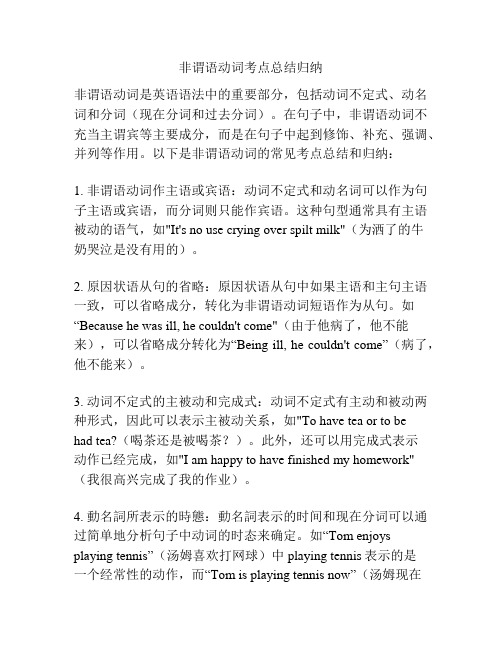
非谓语动词考点总结归纳非谓语动词是英语语法中的重要部分,包括动词不定式、动名词和分词(现在分词和过去分词)。
在句子中,非谓语动词不充当主谓宾等主要成分,而是在句子中起到修饰、补充、强调、并列等作用。
以下是非谓语动词的常见考点总结和归纳:1. 非谓语动词作主语或宾语:动词不定式和动名词可以作为句子主语或宾语,而分词则只能作宾语。
这种句型通常具有主语被动的语气,如"It's no use crying over spilt milk"(为洒了的牛奶哭泣是没有用的)。
2. 原因状语从句的省略:原因状语从句中如果主语和主句主语一致,可以省略成分,转化为非谓语动词短语作为从句。
如“Because he was ill, he couldn't come"(由于他病了,他不能来),可以省略成分转化为“Being ill, he couldn't come”(病了,他不能来)。
3. 动词不定式的主被动和完成式:动词不定式有主动和被动两种形式,因此可以表示主被动关系,如"To have tea or to behad tea?(喝茶还是被喝茶?)。
此外,还可以用完成式表示动作已经完成,如"I am happy to have finished my homework"(我很高兴完成了我的作业)。
4. 動名詞所表示的時態:動名詞表示的时间和现在分词可以通过简单地分析句子中动词的时态来确定。
如“Tom enjoys playing tennis”(汤姆喜欢打网球)中playing tennis表示的是一个经常性的动作,而“Tom is playing tennis now”(汤姆现在正在打网球)中playing tennis则表示现在正在进行的动作。
5. 分词作定语:现在分词和过去分词经常用作定语修饰名词,如shining stars(闪闪发亮的星星)、a book written by Hemmingway(海明威写的一本书)。
(完整版)从句与非谓语之间的转换
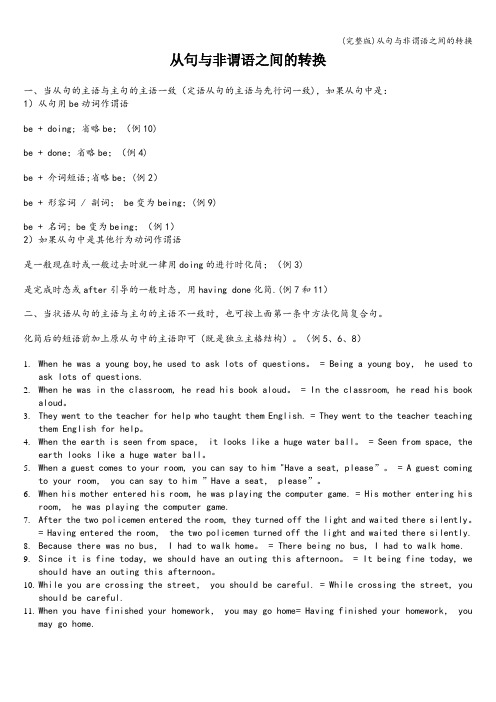
从句与非谓语之间的转换一、当从句的主语与主句的主语一致(定语从句的主语与先行词一致),如果从句中是:1)从句用be动词作谓语be + doing; 省略be;(例10)be + done;省略be;(例4)be + 介词短语;省略be;(例2)be + 形容词 / 副词; be变为being;(例9)be + 名词; be变为being;(例1)2)如果从句中是其他行为动词作谓语是一般现在时或一般过去时就一律用doing的进行时化简;(例3)是完成时态或after引导的一般时态,用having done化简.(例7和11)二、当状语从句的主语与主句的主语不一致时,也可按上面第一条中方法化简复合句。
化简后的短语前加上原从句中的主语即可(既是独立主格结构)。
(例5、6、8)1.When he was a young boy,he used to ask lots of questions。
= Being a young boy, he used toask lots of questions.2.When he was in the classroom, he read his book aloud。
= In the classroom, he read his bookaloud。
3.They went to the teacher for help who taught them English. = They went to the teacher teachingthem English for help。
4.When the earth is seen from space, it looks like a huge water ball。
= Seen from space, theearth looks like a huge water ball。
5.When a guest comes to your room, you can say to him "H ave a seat, please”。
非谓语动词作定语和状语

A A. add B. to add C. adding D. added
3). The disc, digitally ______ in the studio, sounded fantastic at the party that night.
A. recorded
B. recording
C. to be recorded D. being recorded
C Figure” award, a title _____ to ordinary
people for their contributions to
environmental protection.
A. being given B. is given
C. given
D. was given
不定式(to do)
②The question _b_e_i_n_g__d_is_c_u_s_s_e(ddiscuss) at the
meeting now is of quite importance.
③The question __t_o_b_e__d_i_s_cu__s_se_d(discuss) at the
meeting tomorrow is of quite importance.
A. are bought
B. bought
C. have been bought D. buying
解析:此题学生最易错选的答案为A或C。依据上面 陈述,填入A或C句子都有两个谓语动词,而此 处两个动词并非并列谓语,也不是分别出现在主 从句中,故答案有误。该题正确答案为B, bought through a computer为一过去分词短语作后 置定语,句中只有一个谓语can be lower than。当 然此题如改为Prices of daily goods which have been bought through…也是正确的,因为这一动 作出现在从句中。
非谓语动词及从句
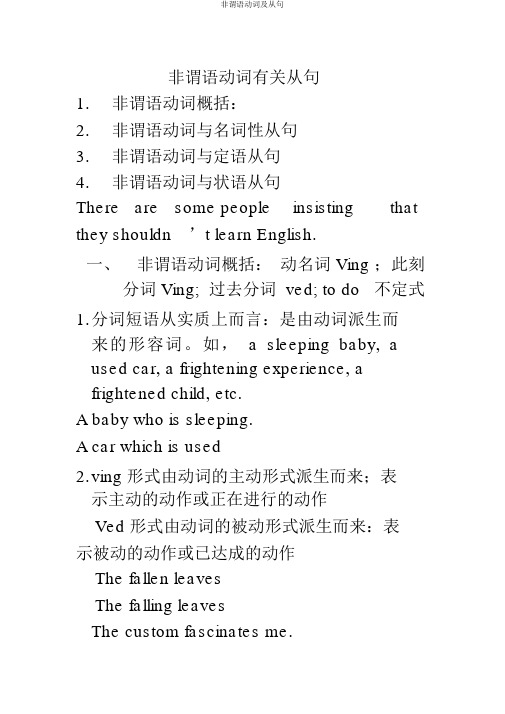
非谓语动词有关从句1.非谓语动词概括:2.非谓语动词与名词性从句3.非谓语动词与定语从句4.非谓语动词与状语从句There are some people insisting that they shouldn’t learn English.一、非谓语动词概括:动名词 Ving ;此刻分词 Ving; 过去分词 ved; to do 不定式1.分词短语从实质上而言:是由动词派生而来的形容词。
如, a sleeping baby, a used car, a frightening experience, a frightened child, etc.A baby who is sleeping.A car which is used2.v ing 形式由动词的主动形式派生而来;表示主动的动作或正在进行的动作Ved 形式由动词的被动形式派生而来:表示被动的动作或已达成的动作The fallen leavesThe falling leavesThe custom fascinates me.The fascinating custom has been the subject of many books.The baby will sleep until eight.Try not to wake a sleeping baby.Some movies are rated X.Children shouldn ’ t see X-rated movies.My leg was broken in three places.My broken leg is healing slowly.The sinking ship= the ship that wassinkingThe sunken ship=the ship that has sunken.Falling leaves=Fallen leaves=3.此刻分词的达成时态:表示分词的动作发生在主句谓语动词动作以前。
状语从句,非谓语动词

状语从句单项填空1. _______ he's old, he can still carry this heavy bag.A. ThoughB. SinceC. ForD. So2. ---Do you know if he _______ to play basket ball with us?---I think he will come if he ______ free tomorrow.A. comes; isB. comes; will beC. will come; isD. will come; will be3. In the zoo if a child _____ into the water and can't swim, the dolphins may come up ______ him.A. will fall; to helpB. falls; to helpC. will fall; helpD. falls; helping4. I don't remember ________ he worked in that city when he was young.A. whatB. whichC. whereD. who5. We will stay at home if my aunt ________ to visit us tomorrow.A. comesB. comeC. will comeD. is coming6. The police asked the children _______ cross the street ________ the traffic lights turned green.A. not; beforeB. don't; whenC. not to; untilD. not; after7. I was late for class yesterday _______ there was something wrong with my bike.A. whenB. thatC. untilD. because8. I'll go swimming with you if I ________ free tomorrow.A. will beB. shall beC. amD. was9. In the exam, the ________ you are, ______ the _______ mistakes you will make.A. careful; littleB. more careful; fewestC. more careful; fewerD. more careful; less10. You should finish your lessons _______ you go out to paly.A. beforeB. afterC. whenD. while11. I hurried _____ I wouldn't be late for class.A. sinceB. so thatC. as ifD. unless12. When you read the book, you'd better make a mark _______ you have any questions.A. whichB. thatC. whereD. though13. The teacher raised his voice _______ all the students could hear him.A. forB. so thatC. becauseD. in order14. He took off his coat _______ he felt hot.A. becauseB. asC. ifD. since15. It is ______ that we'd like to go out for a walk.A. a lovely dayB. too lovely a dayC. so lovely a dayD. such lovely a day16. Mary had ______ much work to do that she stayed at her office all day.A. suchB. soC. tooD. very17. _______ I felt very tired, I tried to finish the work.A. AlthoughB. BecauseC. AsD. As if18. ______ the day went on, the weather got worse.A. WithB. SinceC. WhileD. As19. ______ well you can drive, you must drive carefully.A. So long asB. In order thatC. No matter howD. The moment20. Write to me as soon as you ________ to Beijing.A. will getB. getC. gettingD. got一、时间状语从句在英语中,时间状语从句的连接词常常有:when(当...的时候),whenever(每当...),as(当...时),since(自从...),until(直到...,如果不....),till(直到...),before(在...前),after(在...后),as soon as(一...就),once(一旦...),the moment(一...就),immediately (一...就),the day(在...那天),no sooner... than(一...就),hardly(scarcely)... when(一...就),the instant(一...就),instantly(一...就),directly(一...就),the minute(一...就),the second(一...就),every time(每当...),by the time(等到....的时候)等。
从句与非谓语动词之间的转换

从句与非谓语动词之间的转换非谓语动词和从句可以相互转换,那么如何将复合句改为简单句呢?首先,需要分清主从复合句,然后取消从句,一般要把引导从句的连词去掉。
例如,将"When he was waiting for the bus。
he saw a dog"改为"Waiting for the bus。
he saw a dog"。
其次,如果从句的谓语动词是主动式,就要把谓语动词改为现在分词;如果从句的谓语动词是被动式,就要把谓语动词改为过去分词,并且要注意时态的变化。
例如,将"After he had finished his homework。
he went home"改为"Having finished his homework。
he went home"。
另外,使用分词短语作状语时,它逻辑上的主语必须与句子的主语一致。
如果主从句的主语不一致,在取消掉从句变为-ing或-ed形式时,要把从句的主语保留,其它部分和以前的改法一样。
例如,将"As it was hot。
we went swimming"改为"It being hot。
we went swimming"。
需要注意的是,在使用分词短语作状语时,它也可以有自己独立的逻辑上的主语,这种结构称为独立主格结构。
在很多情况下,它都表示一种伴随的动作或表示一种原因。
例如:1.If the weather allows。
I will go there.2.After the rain ped。
XXX.3.His XXX。
and he prepared to return to his institute.4.With so many comrades absent。
XXX.From the above examples。
we can see that the present participle (-ing) usually indicates an n that is happening at the same time as the main verb in the sentence。
高考语法复习之非谓语动词做状语及与状语从句的相互转化与语法填空的应用

非谓语动词作状语高考对非谓语动词作状语的考查多与对动词其他形式的考查同时进行主要包括以下几个方面的内容:1.不定式作状语;2.-ing分词作状语;3.-ed分词作状语。
一、不定式结构作状语不定式结构作状语通常有以下几种情况:1、目的状语(分词一般不能作目的状语)He bought a bicycle to go to town more quickly .To catch the train ,she hurried through her work注:表目的的不定式还常与so as或in order连用,构成so as (not) to do和in order (not) to do 结构,其中so as (not) to do 不能用于句首。
To get there in time, we got up very early.= In order to get there in time, we got up very early.= We got up very early (in order/so as) to get there in time.2、原因状语不定式结构作原因状语常用在作表语用的形容词后。
I’m sorry to hear that .We’re proud to b e young people of China .We are glad to hear the news.3、结果状语不定式结构作结果状语,有时表示未曾预料到的、或令人不快的结果。
(常和only连用)。
He ran all the way to the station ,only to find the train had left .★而现在分词作结果状语常常是可以预料的结果,是伴随谓语动词而产生的自然结果The police opened fire ,killing the robber .He died ,leaving his wife with five children .4. 有时,不定式还可修饰一个句子,表明说话人的态度。
初二英语(动词时态+状语从句+非谓语动词+特殊考点)
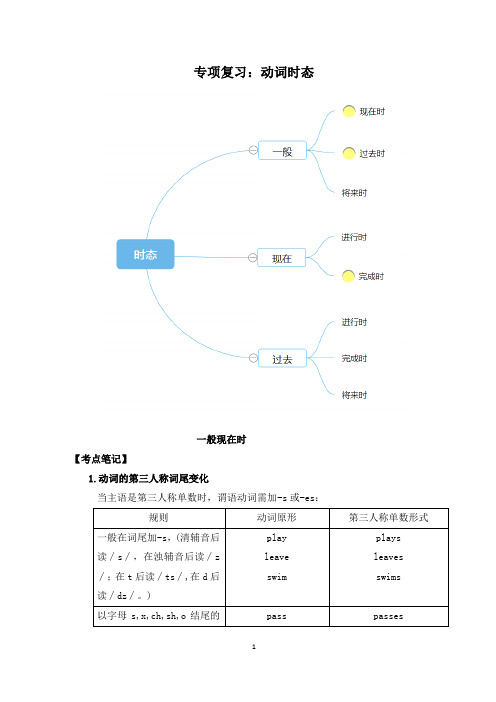
专项复习:动词时态一般现在时【考点笔记】1.动词的第三人称词尾变化当主语是第三人称单数时,谓语动词需加-s或-es:2. 一般现在时的用法1)表示经常的或习惯性的动作,常与表示频度的副词连用。
常用的频度副词有: always、often、 usually、sometimes,seldom、never。
频度副词在句中通常放在行为动词之前,系动词、助动词之后。
Eg, I often go to school by bike.Tom always gets up at 8:00am.2)表示现在的状态。
Eg,Tom studys very hard now.3)表示主语具备的性格、特征和能力等。
Eg, He can speak five foreign languages .That is a beautiful city .Changjiang River is one of the longest rivers in the world.4)表示客观真理,客观存在,自然现象。
Eg, The sun rises in the east .The earth goes around the sun .Ten minus two is eight.Light travels faster than sound .The United States lies by the west coast of the Pacific Ocean. 5)表示按计划或安排好的,或将要发生的动作,可用一般现在时表将来。
但只限于start,begin,leave,go,come,arrive,return,take place等。
Eg, Here comes the bus.English class begins at 8:00.6)在复合句中,当主句是一般将来时,时间或条件状语从句的谓语动词只能用一般现在时来表示将来要发生的动作。
新概念2 非谓语动词 - 分词做状语 归纳总结
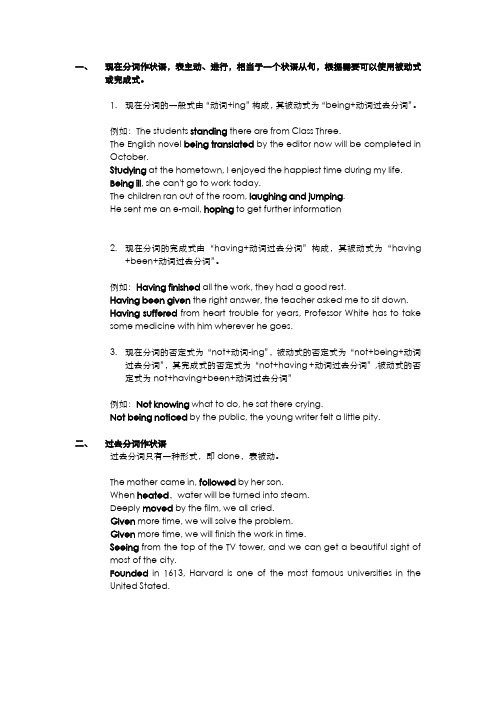
一、现在分词作状语,表主动、进行,相当于一个状语从句,根据需要可以使用被动式或完成式。
1.现在分词的一般式由“动词+ing”构成,其被动式为“being+动词过去分词”。
例如:The students standing there are from Class Three.The English novel being translated by the editor now will be completed inOctober.Studying at the hometown, I enjoyed the happiest time during my life.Being ill, she can't go to work today.The children ran out of the room, laughing and jumping.He sent me an e-mail, hoping to get further information2.现在分词的完成式由“having+动词过去分词”构成,其被动式为“having+been+动词过去分词”。
例如:Having finished all the work, they had a good rest.Having been given the right answer, the teacher asked me to sit down.Having suffered from heart trouble for years, Professor White has to takesome medicine with him wherever he goes.3.现在分词的否定式为“not+动词-ing”,被动式的否定式为“not+being+动词过去分词”,其完成式的否定式为“not+having +动词过去分词”,被动式的否定式为not+having+been+动词过去分词”例如:Not knowing what to do, he sat there crying.Not being noticed by the public, the young writer felt a little pity.二、过去分词作状语过去分词只有一种形式,即done,表被动。
状语从句与非谓语动词的转化(写作)
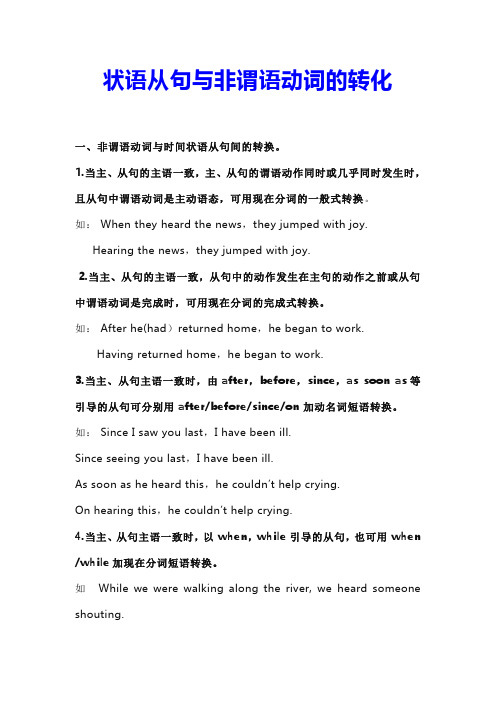
状语从句与非谓语动词的转化一、非谓语动词与时间状语从句间的转换。
1.当主、从句的主语一致,主、从句的谓语动作同时或几乎同时发生时,且从句中谓语动词是主动语态,可用现在分词的一般式转换。
如: When they heard the news,they jumped with joy.Hearing the news,they jumped with joy.2.当主、从句的主语一致,从句中的动作发生在主句的动作之前或从句中谓语动词是完成时,可用现在分词的完成式转换。
如: After he(had)returned home,he began to work.Having returned home,he began to work.3.当主、从句主语一致时,由after,before,since,as soon as等引导的从句可分别用after/before/since/on加动名词短语转换。
如: Since I saw you last,I have been ill.Since seeing you last,I have been ill.As soon as he heard this,he couldn’t help crying.On hearing this,he couldn’t help crying.4.当主、从句主语一致时,以when,while引导的从句,也可用when /while加现在分词短语转换。
如While we were walking along the river, we heard someone shouting.While walking along the river,we heard some one shouting.5.当主、从句的主语一致,且从句的谓语动词是被动语态时,可用过去分词短语转换。
如:After they were sent to the zoo, the monkeys had good health. Sent to the zoo, the monkeys had good health.6.当主、从句的主语不一致时,时间状语从句可转换成分词的独立主格结构,即名词/主格代词+分词。
原题目: 状语从句与非谓语动词的转化(写作)

原题目: 状语从句与非谓语动词的转化(写作)在写作中,状语从句和非谓语动词都是常用的语法结构。
它们可以用来表达时间、原因、条件、目的等不同的含义。
本文将对状语从句和非谓语动词的使用进行比较,并提供一些转化的方法。
一、状语从句的转化状语从句在句子中作为状语,通常由连词引导。
为了使句子更加简洁明了,我们可以将状语从句转化为其他形式。
1. 将状语从句转化为分词短语例如:- 状语从句:因为我迟到了,所以老师生气了。
- 分词短语:迟到了,老师生气了。
2. 将状语从句转化为不定式短语例如:- 状语从句:虽然天气很冷,但他还是出去了跑步。
- 不定式短语:天气很冷,他还是出去了跑步。
3. 将状语从句转化为介词短语例如:- 状语从句:当他听到好消息时,他高兴得跳了起来。
- 介词短语:听到好消息时,他高兴得跳了起来。
二、非谓语动词的转化非谓语动词是动词的一种形式,可以作主语、宾语、定语或状语。
在写作中,我们可以将非谓语动词转化为其他形式,以减少句子的复杂性。
1. 将非谓语动词转化为动词-ing形式例如:- 非谓语动词:我喜欢读书。
- 动词-ing形式:我喜欢阅读。
2. 将非谓语动词转化为动词不定式例如:- 非谓语动词:他跟我一起完成了任务。
- 动词不定式:他和我一起完成任务。
3. 将非谓语动词转化为名词例如:- 非谓语动词:她喜欢游泳。
- 名词:她喜欢游泳。
总结:通过将状语从句和非谓语动词进行转化,可以使句子更加简洁明了。
在实际写作中,我们可以根据需要选择合适的转化形式。
然而,需要注意的是,转化时要注意保持句子的逻辑完整性和语法准确性。
以上是关于状语从句与非谓语动词的转化的简介,希望能对您有所帮助。
【写作指导】状语从句与非谓语动词的转化(写作)
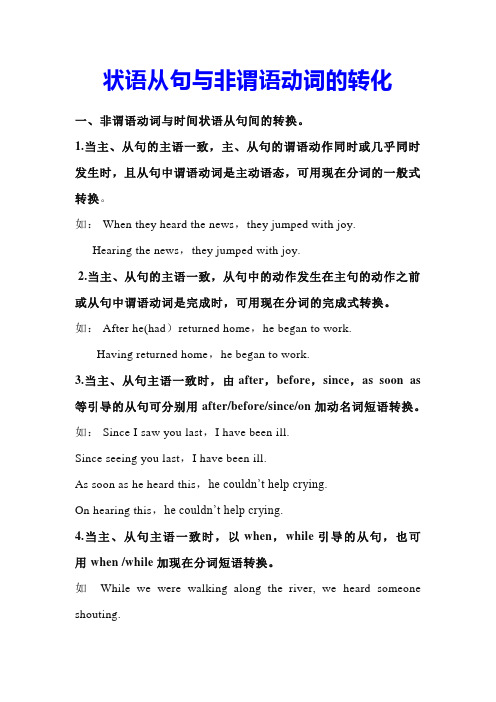
状语从句与非谓语动词的转化一、非谓语动词与时间状语从句间的转换。
1.当主、从句的主语一致,主、从句的谓语动作同时或几乎同时发生时,且从句中谓语动词是主动语态,可用现在分词的一般式转换。
如: When they heard the news,they jumped with joy.Hearing the news,they jumped with joy.2.当主、从句的主语一致,从句中的动作发生在主句的动作之前或从句中谓语动词是完成时,可用现在分词的完成式转换。
如: After he(had)returned home,he began to work.Having returned home,he began to work.3.当主、从句主语一致时,由after,before,since,as soon as 等引导的从句可分别用after/before/since/on加动名词短语转换。
如: Since I saw you last,I have been ill.Since seeing you last,I have been ill.As soon as he heard this,he couldn’t help crying.On hearing this,he couldn’t help crying.4.当主、从句主语一致时,以when,while引导的从句,也可用when /while加现在分词短语转换。
如While we were walking along the river, we heard someone shouting.While walking along the river,we heard some one shouting. 5.当主、从句的主语一致,且从句的谓语动词是被动语态时,可用过去分词短语转换。
如:After they were sent to the zoo, the monkeys had good health.Sent to the zoo, the monkeys had good health.6.当主、从句的主语不一致时,时间状语从句可转换成分词的独立主格结构,即名词/主格代词+分词。
英语语法:非谓语动词、反义疑问句、名词性从句、状语从句

Would you like me to go with
宾 宾补
you?
主动语态: 一感:feel sb do 二听:hear sb do 三使:make sb do 五看:see sb do observe sb do 被动语态一定要加 to 例:He made me cry.(主动) I was made to cry.(被动) I notice him cry.(主动) He was noticed to cry. (被动) 4. 动词不定式作表语 is to become a doctor.
5
练习: 1. Walking in the street, she found me doing some shopping. (walk) 2. Being sick, he didn’t come. (be) 3. Walking in the street, a car knocked him down. (walk) 4. Seen from the top of the hill, the park looks nice. (see) 5. Given another half an hour, he can finish it. (give) 6. She sat under the tree, reading the newspaper. (read) 7. The film star came out, followed by many reporters. (follow) 8. Heated, water can be changed into vapor. (hate) 9. Not having done it well, he tried to do it again. (do)
正式和非正式英语的一些表达形式
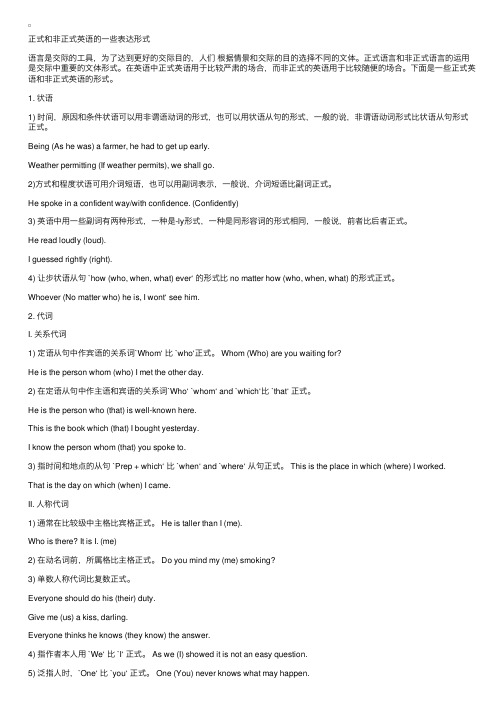
正式和⾮正式英语的⼀些表达形式语⾔是交际的⼯具,为了达到更好的交际⽬的,⼈们根据情景和交际的⽬的选择不同的⽂体。
正式语⾔和⾮正式语⾔的运⽤是交际中重要的⽂体形式。
在英语中正式英语⽤于⽐较严肃的场合,⽽⾮正式的英语⽤于⽐较随便的场合。
下⾯是⼀些正式英语和⾮正式英语的形式。
1. 状语1) 时间,原因和条件状语可以⽤⾮谓语动词的形式,也可以⽤状语从句的形式,⼀般的说,⾮谓语动词形式⽐状语从句形式正式。
Being (As he was) a farmer, he had to get up early.Weather permitting (If weather permits), we shall go.2)⽅式和程度状语可⽤介词短语,也可以⽤副词表⽰,⼀般说,介词短语⽐副词正式。
He spoke in a confident way/with confidence. (Confidently)3) 英语中⽤⼀些副词有两种形式,⼀种是-ly形式,⼀种是同形容词的形式相同,⼀般说,前者⽐后者正式。
He read loudly (loud).I guessed rightly (right).4) 让步状语从句 `how (who, when, what) ever‘ 的形式⽐ no matter how (who, when, what) 的形式正式。
Whoever (No matter who) he is, I wont‘ see him.2. 代词I. 关系代词1) 定语从句中作宾语的关系词`Whom‘ ⽐ `who‘正式。
Whom (Who) are you waiting for?He is the person whom (who) I met the other day.2) 在定语从句中作主语和宾语的关系词`Who‘ `whom‘ and `which‘⽐ `that‘ 正式。
He is the person who (that) is well-known here.This is the book which (that) I bought yesterday.I know the person whom (that) you spoke to.3) 指时间和地点的从句 `Prep + which‘ ⽐ `when‘ and `where‘ 从句正式。
状语从句非谓语动词作定语例句英语
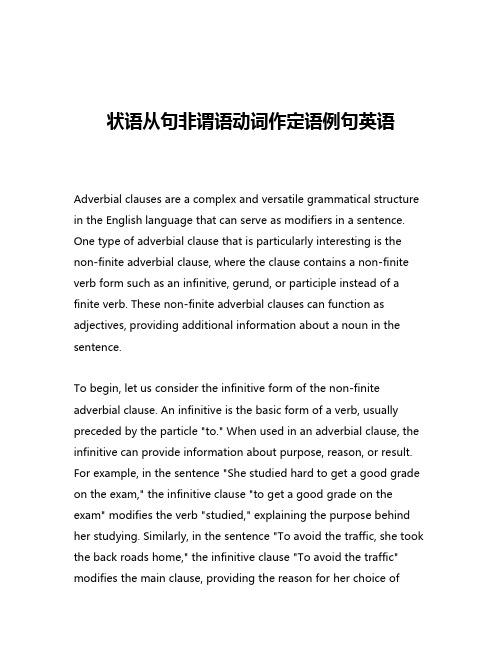
状语从句非谓语动词作定语例句英语Adverbial clauses are a complex and versatile grammatical structure in the English language that can serve as modifiers in a sentence. One type of adverbial clause that is particularly interesting is the non-finite adverbial clause, where the clause contains a non-finite verb form such as an infinitive, gerund, or participle instead of a finite verb. These non-finite adverbial clauses can function as adjectives, providing additional information about a noun in the sentence.To begin, let us consider the infinitive form of the non-finite adverbial clause. An infinitive is the basic form of a verb, usually preceded by the particle "to." When used in an adverbial clause, the infinitive can provide information about purpose, reason, or result. For example, in the sentence "She studied hard to get a good grade on the exam," the infinitive clause "to get a good grade on the exam" modifies the verb "studied," explaining the purpose behind her studying. Similarly, in the sentence "To avoid the traffic, she took the back roads home," the infinitive clause "To avoid the traffic" modifies the main clause, providing the reason for her choice ofroute.Gerund phrases can also function as non-finite adverbial clauses. A gerund is the "-ing" form of a verb used as a noun. When placed in an adverbial clause, the gerund phrase can express time, manner, or cause. For instance, in the sentence "By working overtime, she was able to finish the project on time," the gerund phrase "By working overtime" modifies the main clause, indicating the manner in which she completed the project. Alternatively, in the sentence "Having studied the material thoroughly, she felt prepared for the exam," the gerund phrase "Having studied the material thoroughly" provides information about the time or circumstances before the main clause event.Finally, participles can be used in non-finite adverbial clauses as well. Participles are verb forms that function as adjectives, either in the present tense ("-ing" form) or the past tense ("-ed" or "-en" form). When used in an adverbial clause, participles can express time, cause, or condition. For example, in the sentence "Worried about the weather forecast, they decided to postpone their outdoor picnic," the present participle clause "Worried about the weather forecast" modifies the subject "they," indicating the reason behind their decision. Conversely, in the sentence "Having finished her chores, she was able to relax for the evening," the past participle clause "Having finished her chores" provides information about the timebefore the main clause event.It is important to note that non-finite adverbial clauses can be positioned in different places within the sentence, depending on the specific information they are conveying. They can be placed at the beginning, middle, or end of the main clause, and their placement can impact the emphasis and flow of the sentence. Additionally, these non-finite adverbial clauses can be combined with other grammatical structures, such as relative clauses or conditional clauses, to create even more complex and nuanced sentences.In conclusion, non-finite adverbial clauses, whether containing infinitives, gerunds, or participles, are a valuable tool in the English language for providing additional information and context within a sentence. By understanding how these structures function and the various ways they can be employed, writers can craft more sophisticated and expressive prose. The ability to effectively utilize non-finite adverbial clauses is an important skill for anyone seeking to improve their English language proficiency and communication abilities.。
(完整word)非谓语动词作状语全解讲解

非谓语动词作状语全解不定式和分词作状语的用法一、不定式作状语可以作:1。
主要用作目的状语。
常与 in order to do (为了或 so as to do(以便连用。
so as to 不用于居首。
He got up early in order to catch the first bus. 他早起为了赶上第一班车。
He sat down to have a rest。
他坐下来休息。
He went to France to learn French. 他去法国学习法语.They stood by the roadside to talk about the plan.他们站在路边为的是谈论这个计划。
They stopped to ask the way. 他们停下来问路. (停下来的目的2。
作结果状语。
表示出乎意料的结果。
做结果状语的不定式只能出现在句子的末尾,常见的不定式动词有:to find, to hear, to see, to be told, to form, to give, to make,to produce 等。
He hurried to the station only to find the train gone. 他匆匆忙忙地赶到火车站,发现火车已经开走了.He woke up to find everybody gone。
他醒来发现大家都走了。
His family was too poor to support him。
他的家庭太穷,不能维持他的生活. The boy is not tall enough to reach the book shelf。
这男孩个子不够高, 手伸不到书架。
He is old enough to go to school。
他到上学年龄了.He lifted a rock only to drop it on his own feet.他搬起石头砸了自己的脚。
状语从句、非谓语动词与写作
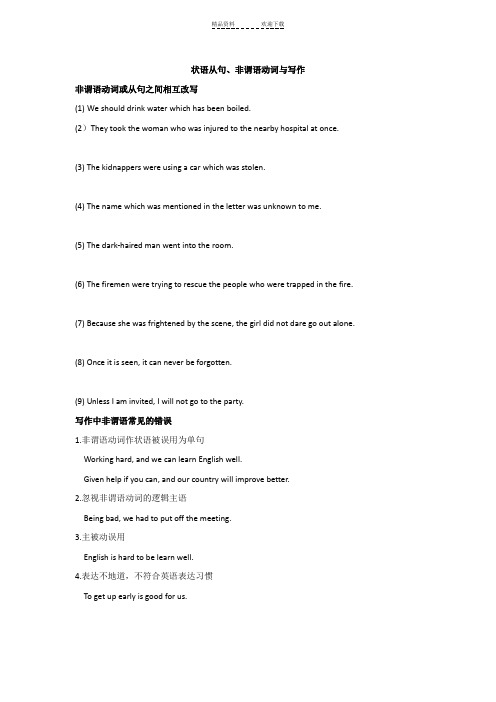
状语从句、非谓语动词与写作非谓语动词或从句之间相互改写(1)We should drink water which has been boiled.(2)They took the woman who was injured to the nearby hospital at once.(3) The kidnappers were using a car which was stolen.(4) The name which was mentioned in the letter was unknown to me.(5) The dark-haired man went into the room.(6) The firemen were trying to rescue the people who were trapped in the fire.(7) Because she was frightened by the scene, the girl did not dare go out alone.(8) Once it is seen, it can never be forgotten.(9) Unless I am invited, I will not go to the party.写作中非谓语常见的错误1.非谓语动词作状语被误用为单句Working hard, and we can learn English well.Given help if you can, and our country will improve better.2.忽视非谓语动词的逻辑主语Being bad, we had to put off the meeting.3.主被动误用English is hard to be learn well.4.表达不地道,不符合英语表达习惯To get up early is good for us.写作中复合句常见的错误1.只有从句,没有主句The keeper who had lived in the light tower for a long time.2.以逗号代替句号,把两个简单句当成一个句子The old man thought of his son, tears came down from his face.4.过多地使用并列句组合信息①It is a beautiful day, and the sun is shining and a breeze is blowing.②We were driving out into the country, and we saw our English teacher riding in a bus, and the bus was crowded.学会运用复合句和非谓语动词用一句话表达1.①Kate is a new student. ②She comes from a northern province. ③She speaks a dialect.2.不是人人都能精通英语,小学生同时学汉语和英语反而会影响汉语学习。
- 1、下载文档前请自行甄别文档内容的完整性,平台不提供额外的编辑、内容补充、找答案等附加服务。
- 2、"仅部分预览"的文档,不可在线预览部分如存在完整性等问题,可反馈申请退款(可完整预览的文档不适用该条件!)。
- 3、如文档侵犯您的权益,请联系客服反馈,我们会尽快为您处理(人工客服工作时间:9:00-18:30)。
㈠状语从句1. –Can I join your club, Dad? –You can when you ____ a bit older.A. getB. will getC. are gettingD. will have got2. –When will you come to see me, Dad? --I will go to see you when you ___ the training courseA. will have finishedB. will finishC. are finishingD. finish3. I think it is necessary for my 19-year-old son to have his own mobile phone, for I sometimes want to make sure if he ___ home for dinner. A. come B. comes C. has come D. will come4. –What would you do if it ___ tomorrow? –We have to carry it on, since we’ve got everything ready. A. rain B. rains C. will rain D. is raining5. When first ___ to the market, these products enjoyed great success.A. introducingB. introducedC. introduceD. being introduced6. Several weeks had gone by ___ I realized the painting was missing.A. asB. beforeC. sinceD. when7. –Why didn’t you tell him about the meeting?—He rushed out of the room ____ I could say a word. A. before B. until C. when D. after8. ___ the day went on, the weather got worse. A. with B. since C. while D as9. –Did Linda see the traffic accident? –No, no sooner ___ than it happened.A. had she goneB. she had goneC. has she goneD. she has gone10. It is almost five years ___ we saw each other last time. A. before B. since C. after D. when11. –Did you remember to give Mary the money you owed her? –Yes. I gave it to her __ I saw her.A. whileB. the momentC. suddenlyD. once12. There were dirty marks on her trousers ___ she had wiped her hands.A. whereB. whichC. whenD. that3 ___everybody knows about it, I don’t want to talk any more. A. for B. even C. since D. however14. ___ you’ve got a chance, you might as well make full use of it.A. Now thatB. AfterC. AlthoughD. As soon as15. A man cannot smile like a child, ____ a child smiles with his eyes, while a man smiles with his lips alone. A. so B. but C. and D. for16. The WTO cannot live up to its name ___ it does not include a country that is home to one fifth of mankind. A. as long as B. while C. if D. even though17. ___ I know the money is safe, I shall not worry about it.A. Even thoughB. unlessC. As long asD. While18. ___ most of the earth’s surface is covered by water, fresh water is very rare and precious.A. AsB. OnceC. IfD. Although19. There was never any time for Kate to feel lonely, ___ she was an only child.A. ever sinceB. now thatC. even thoughD. even as20. ___ modeling business is by no means easy to get into, the good model will always be in demand. A. While B. Since C. As D. If21. Why do you want a new job ___ you’ve got such a good one already?A. thatB. whereC. whichD. when22. You should try to get a good night’s sleep ___ much work you have to do.A. howeverB. no matterC. althoughD. whatever23. The old tower must be saved,___ the cost. A. however B. whatever C. whichever D. wherever24. Roses need special care ___ they can live through winter. A. because B. so that C. even if D. as25. She told us ___ story that we all forgot the time.A. such an interestingB. such interesting aC. so an interesting . D a so interesting6 John plays football___, if not better than, David. A. as well B. as well as C. so well D. so well 27. Someone called me up in the middle of the night, but they hung up ___ I could answer the phone. A. as B. since C. until D. before28. So difficult ___ it to work out the problem that I decided to ask Tom for advice.A. I did findB. did I findC. I have foundD. have I found29. Scientists say it may be five or six years ___ it is possible to test this medicine on human patients. A. since B. after C. before D. when30. Simon thought his computer was broken ___ his little brother pointed out that he had forgotten to turn it on. A. until B. unless C. after D. because31. Send my regards to your lovely wife when you ___ home.A. wroteB. will writeC. have writtenD. write32. It is known to all that ___ you exercise regularly, you won’t keep good health.A. unlessB. wheneverC. althoughD. if33.If you are traveling ___ the customs are really foreign to your own, please do as the Romans doA. in whichB. whatC. whenD. where34. A good storyteller must be able to hold his listeners’ curiosity ___ he reaches the end of the story. A. when B. unless C. after D. until35. He made a mistake, but then he corrected the situation ____ it got worse.A. untilB. whenC. beforeD. as36. Don’t be afraid of asking for help ____ it is needed. A. unless B. since C. although D. when37. I would appreciate it ___ you call back this afternoon for the doctor’s appointment.A. untilB. ifC. whenD. that38. –Was his father very strict with him when he was at school? –Yes. He had never praised him __ he became one of the top students in his grade. A. after B. unless C. until D. when39. My parents were quarrelling about me ___ I could not quite tell why.A. sinceB. thoughC. ifD. until40. He tried his best to solve the problem, ___ difficult it was.A. howeverB. no matterC. whateverD. although I41. ____I accept that he is not perfect, I do actually like the person.A. whileB. sinceC. beforeD. unless42. I’d like to arrive 20 minutes early ___ I can have time for a cup of tea.A. as soon asB. as a resultC. in caseD. so that43. I always take something to read when I go to the doctor’s ___ I have to wait.A. in caseB. so thatC. in orderD. as if44. ___ you have tried it, you can’t imagine how pleasant it is.A. UnlessB. BecauseC. AlthoughD. When45. Don’t leave the sharp knife ___ our little Jane can get it.A. in whichB. to whichC. thatD. where㈡状语从句l. - Is Mrs. White in the office?- Yes,___ she is on duty, she must be thereA. sinceB. untilC. whileD. if2. ____ journalism seems like a good profession (职业), I would prefer to be a teacher.A. AlthoughB. EvenC. No matter D .Now that.3. _______ he wants to fire you, l suggest you stop wearing sport clothes in the office.A. IfB. SinceC. UntilD. Unless,4. She tried to phone him, _______there was no answer because he was abroad.A. sinceB. whileC. soD. but5. _______ I prefer a color TV, I have to buy a black and white one this time.A. AsB. SinceC. BecauseD. Although6. I had just started back for the house to change my clothes _______ I heard the voices.A. asB. forC. whileD. When7. You can speak French well _______ you practise it with a Frenchman every day.A. unlessB. althoughC. as long asD. so that8.The lady will have to wait all day _______ the doctor Works faster.A. ifB. unlessC. whetherD. that9. The class went on with the story _______they had left it before the holiday.A. whereB. whichC. in whichD. when10. Would you like to have a break _______ shall we go on with the work?A. andB. thenC. thereforeD. or11. We didn’t plan to meet. We meet ___ in the street.A. by the wayB. by chanceC. on purposeD. in surprise12. --- What are you going to do this afternoon?- I’ll probably go for a walk later on ___ it stays fine.A. as far asB. so long asC. even ifD. as ifl3 .I couldn’t make out wha t they were saying, for they spoke to me _______.A. right awayB. all the timeC. in allD. at oncel4. - Could you tell me where Jim lives?--_______Jim used to live next door to us, and now he is living in another town.A. At the timeB. At one timeC. At a timeD. At timesl5. In order to continue to learn by ourselves when we have left school, we must____ study how to 1earn in the school now.A. in allB. after allC. for allD. at alll6.I came home very late last night, ___, early this morning.A. at latestB. on the wholeC. in a wordD. or rather17. I’m sure ghosts (at) do not exist. _____, I have never seen one.A. First of allB. Now and thenC. Day and nightD. At least18. The day must be breaking, _______ the birds have begun singing.A. becauseB. asC. forD. since19. You can go out _______ you Promise to be back before 10 o’clock.A. now thatB. so long asC. so thatD. as far as20. Smoking does great harm to our health. _______many people smoke in Public Places.A. ThereforeB. HoweverC. AlthoughD. No matter2l. Dr. Bethune began to work _______ he arrived at the front.A. the momentB. by the timeC. beforeD. at the moment22 .This class named _______Lei Feng is one of the best classes in this school.A. in honour ofB. in the place ofC. in favour ofD. in the way of23. We had to he patient because it_______ some time _______we got the full result.A. have been; sinceB. had been; untilC. was; afterD. would be; before24. I am sorry I didn’t do a good job. - Never mind, _______you have tried your best.A. Above allB. In allC. At allD. After all l25. Whoever is_______ advanced can pass this test.A. more and moreB. more or lessC. no moreD. any the less26. _______ others say, the Professor is sure that his theory is correct.A. No matterB. It doesn’t matter C .Whatever D. What27.l won’t give you any help_______ you tell me the truth. It’s none of my business.A. unlessB. sinceC. ifD. even if28. Only one third of the people present at the meeting were ______the revision (修订) of the rules.A. in agreement ofB. in favour ofC. in forD. with the side of29. Many places are flooded by heavy rainfalls, so they can’t walk _______they like these days.A. whenB. wheneverC. whereD. Wherever30. - How do we do the cleaning?- Do it___: Sweep the floor, wipe the desks, rub the windows and put everything in order.A. as usualB. as followsC. as followingD. like that3l. It’s cloudy. Take an umbrella _______you regret it.A. orB. andC. afterD. before32.His father began to work ______his childhood.A. sinceB. beforeC. as early asD. while33. The roof fell _____he had time to dash into the room to save his baby.A. beforeB. asC. afterD. until34.- The thread of my kite broke and it flew away.- I had told you it would easily break_______ it was the weakest.A. whenB. whereC. unlessD. since35. The crowd started cheering _______he rose to speak.A. asB. sinceC. tillD. where36. I had worked here _______you came here. But l shall leave for England_______.A. before long; before longB. bore long; long beforeC. long before; before longD. long before; long before37. Scientists say it may be five or ten years _______it is possible to test this medicine on human patients.A. sinceB. beforeC. afterD. when38. We called the First - Aid Center_______ the traffic accident happened.A. immediatelyB. shortlyC. quicklyD. hurriedly39. ______ you keep on, you'll succeed. Wish you success in the examinations.A. WhenB. No matter how hardC. So long asD. Now that40.- Do you think we can get there on time? - Yes, _______ the car doesn’t break down.A. even ifB. unlessC. untilD. so long as4l..- Let Jack take the place. He’s older and should be more experienced.- I don’t think so. A man doesn’t necessarily grow wiser_______ he grows older.A. becauseB. thatC. thanD. as42. ______you understand this rule, you will have no further difficulty.A. WhileB. OnceC. ThoughD. Unless43 .- Was he pleased to hear the news? --_______ Pleased, even excited.A. No more thanB. More thanC. MoreD. More or less44. _______, his wife will stand at the gate to wait for him to come back.A. However he is lateB. However is he lateC. However late he isD. However late is he45. –Haven’t the curtains been drawn yet?- No, ____ the lamps outside have already been lighted.A. thoughB. sinceC. whenD. after46. Of course they were later than expected; but___ they were in time to start the game.A. at allB. after allC. in allD. for all47. I’ll give him your message______ he comes back from lunch.A. untilB. as soon asC. whileD. before48. He whispered to his wife_______ he might wake up the sleeping baby.A. so thatB. on condition thatC. for fear thatD. so long as49. -- May l come in right now?- Certainly, ______only two are allowed at a time.A. soB. thereforeC. butD. unless50.I don’t believe ____ he says now. He is a cheat.A. no matter whatB. everythingC. whateverD. however非谓语动词练习7. 非谓语动词做定语的区别:166. The chair looks rather hard, but in fact it is very comfortable to __________.A. sitB. sit onC. be satD. be sat on 167. I’m not sure which restaurant ___________.A. to eat onB. eating atC. to eat atD. for eating 168. ---―What do you think of this middle school?‖---―It is a very good ___________.‖A. school to studyB. school to study inC. studying schoolD. school for children to study169. ---―I’d like to buy an expensive camera.‖---―Well, we have several models ___________.‖A. to choose fromB. of choiceC. to be chosenD. for choosing 170. We had no money and no place __________.A. to live inB. to liveC. living inD. living 171. He loves parties. He is always the first __________ and the last __________.A. coming, leavingB. to come, to leaveC. comes, leavesD. come, leave 172. Before he had no chance __________.A. to go to schoolB. to go schoolC. going to schoolD. to go to the school 173. Now the need __________ other people’s language is becoming greater and greater.A. to learnB. learningC. to be learnedD. being learned 174. This is an important matter. I need at least a day or two __________.A. of thinking over itB. to think it overC. of thinking it overD. to think over it175. It is time __________ wheat.A. for sowB. of sowingC. to sowD. to sowing176. ―Do you have any clothes __________ today?‖ the maid asked.A. to washB. to be washedC. washD. be washed 177. This is the best play __________ last year.A. to performB. to be performedC. performingD. to have performed 178. This book can be used in __________ countries.A. English-speakingB. English-spokenC. English-spokeD. English-speak 179. At present, English is the main subject ___________ here.A. to be taughtB. being taughtC. teachingD. to be teaching 180. Snow was falling when they went along a mountain path __________ to the front.A. to leadB. ledC. leadingD. being led181. ---―Who are those people with the banner?‖---―A group __________ itself the League for peace.‖A. callingB. callsC. calledD. is called182. ―The picture writing‖ __________ long long ago is hard for us to understand today.A. having been drawnB. being drawnC. was drawnD. drawn183. How I regret the days __________ in doing the useless work!A. which wastedB. having been wastedC. which wastingD. having wasted184. The students, _____ at the way the questions were put, didn’t know the answers to them.A. they surprisingB. surprisedC. their being surprisedD. surprise185. The pen __________ belongs to me.A. which it is on the tableB. lying on the tableC. is on the tableD. which on the table非谓语动词练习8. 非谓语动词做状语的区别:186. This dish cloth is __________ for me to dry the dishes.A. so wetB. wet enoughC. as wetD. too wet187. The house is much too small __________.A. for us to liveB. for us to live inC. that we can’t liveD. that we can’t live in 188. The light was strong enough __________.A. read byB. to read byC. read underD. to read189. H didn’t speak slow ly enough __________.A. every one understoodB. for everyone understoodC. for everyone to understandD. for everyone to be understood190. Would you be __________ to show me the way to the City Hall?A. good enoughB. good enough asC. so goodD. as good as191. He was so foolish __________ his car unlocked.A. to leaveB. that leaveC. as to leaveD. for him to leave 192. Napoleon spoke so loudly as to __________ in front of his soldiers.A. hearB. be heardC. listenD. be listened193. Do you think him easy __________.A. to get along withB. to get alongC. to be got along withD. to be got along194. The water is good __________.A. to drink itB. to be drunkC. to drinkD. at drinking195. His speech in English was difficult __________ .A. in followingB. for being followedC. to followD. to be followed by 196. Good-bye, Mr Jones. I’m pleased __________.A. for meeting youB. to meet youC. to have been meeting youD. to have met you 197. I have enjoyed my visit here. I’ll be very sorry __________.A. for leavingB. of leavingC. to leaveD. left198. I spoke to him kindly _________ him.A. to not frightenB. so as not to frightenC. in order to not frightenD. for not frightening199. Tom is waiting __________ the doctor.A. to seeB. for to seeC. for seeingD. for see200. I went to see him __________ him out.A. findingB. findC. only to findD. only found 201. _________, one needs much practice.A. To learn swimming wellB. To learn to swim wellC. Swimming to be learned wellD. Learning swim well202. __________, I don’t like her sister.A. Telling the truthB. Been told the truthC. To tell the truthD. To tell the true203. __________ for several weeks, the city was short of food and clothing.A. As having floodedB. As floodingC. Having been floodedD. to flood204. __________ tomorrow’s lessons, I have no time to go out with you.A. Not preparingB. Not prepareC. Not being preparedD. Not having prepared 205. _________ from the tallest building, the whole city looks very beautiful..A. SeeB. SawC. SeeingD. Seen206. Look around when ___________ the street.A. acrossB. crossingC. crossedD. to be crossing 207. We walked as fast as we could, __________ to catch the 9:30 train.A. hopingB. to hopeC. we hopedD. being hoped208. ___________ the past, our life is much better.A. Comparing withB. Be compared withC. To compare withD. Compared with 209. __________ the cry for help, people immediately rushed out of the rooms.A. To hearB. HearingC. Having heardD. They hearing 210. It __________ heavily, the outing had to be put off.A. being rainedB. being rainingC. rainingD. rains211. The sun __________, they went home.A. set downB. settedC. settingD. sets212. __________ the concert began.A. The listeners having taken their seatsB. Having taken their seatsC. Have taken their placesD. The listeners to have taken their places 213. __________ Hello, he reached out his hand.A. SaidB. SayingC. Talked aboutD. Talking to214. He rushed into the room, __________.A. with sweat drippingB. sweat drippedC. dripped sweatD. sweated215. __________, I went out for a walk.A. There was nothing to doB. There being nothing to doC. There had nothing to doD. There were nothing to do非谓语动词练习9. 综合练习:216. In the past, people used _________ that the moon was too far away __________. But now it is possible for man __________ there by spaceship.A. to think, not to reach, to getB. to think, to reach, to getC. to thinking, to reach, will getD. thought, to reach, to get to217. Her son promised __________ in the bedroom until the baby stopped __________.A. staying, to cryB. to stay, cryingC. for staying, to cryD. to stay, to cry 218. I hadn’t expected Robert __________ but I had hoped __________.A. to apologize, that he could callB. apologize, that he would callC. to apologize, him to call meD. apologize, him to call me219. I wondered whether the film was __________ worth __________.A. very, to seeB. well, seeingC. very, begin seenD. well, to be seen 220. The man managed to make himself __________ with his __________ French.A. understood, breakingB. understand, brokenC. understand, breakingD. understood, broken221. I forbid __________ here. Who has permitted you _________ here?A. smoking, to smokeB. smoke, smokingC. smoking, smokingD. to smoke, smoking222. Mrs Smith warned her daughter __________ after drinking.A. never to driveB. to never driveC. never drivingD. never drive223. A person __________ a foreign language must be able to use the foreign language __________ all his own.A.learning, forgettingB. who learns, to forgetC. to learn, to forgetD. using, but 224. __________ from the moon, our earth, with water __________ seven percent of its surface, appear as a ―blue ball‖.A. Seen, coveredB. Seeing, coveringC. Seen, coveringD. To see, to cover 225. As she is looking forward to __________ from me, please remember __________ this letter on your way to school.A. hear, postB. hearing, to postC. be heard, postingD. be hearing, to posting 226. The sentence needs __________.A. to improveB. improveC. improvingD. improved227. He is __________ honest a man __________ a lie.A. so, to tellB. too, to tellC. very, to tellD. such, that tell 228. The lecture began by ______ us where the island was, and went on ______ about its history.A. telling, talkingB. to tell, to talkC. telling, to talkD. he told, talking 229. After seeing the movie, ___________.A. the book was read by himB. the book made him want to read itC. he wanted to read the bookD. the reading of the book interested him 230. He is said __________ for five years.A. to have diedB. to have been deadC. to dieD. dead231. I don’t t hink it advisable __________.A. your studying mathsB. you to study mathsC. for you to study mathsD. of you to study maths232. ---―Did you have any difficulty in today’s homework?‖---―No, in fact I found __________.‖A. it very easy to doB. it very easy doneC. very easy for doingD. very easy to do it233. It is better to lose one’s life than __________.A. if you lose your spiritB. losing his spiritC. to lose one’s spiritD. your spirit getting lost234. ---―Why doesn’t he make notes?‖---―He has no pen __________. He seems __________ it.‖A. to write, to forget bringingB. to write with, to forget to bringC. to use with, to have forgotten bringD. to write with, to have forgotten to bring 235. It is foolish _________ such a mistake.A. for me to makeB. for me makingC. of me to makeD. of me making 236. ---―Shall we go skating or stay at home?‖---―Which __________ do yourself?‖A. do you ratherB. would you ratherC. will you ratherD. should you rather237. They knew her very well. They had seen her __________ up from childhood.A. growB. grewC. was growingD. to grow 238. Last summer I took a course on _________.A. how to make dressesB. how dresses be madeC. how to be made dressesD. how dresses to be made239. Tom kept quiet about the accident __________ lose his job.A. so not as toB. so as not toC. so as to notD. not so as to 240. She reached the top of the hill and stopped ______ on a big rock by the side of the path..A. to have restedB. restingC. to restD. rest241. What’s the language __________ in Germany?A. speakingB. spokenC. be spokenD. to speak 242. ---―I usually go there by train.‖---―Why not __________ by boat for a change?‖A. to try goingB. trying to goC. to try and goD. try going 243. The next morning she found the man _________ in bed, dead.A. lyingB. lieC. layD. laying244. Most of the people __________ to the party were famous scientists.A. invitedB. to invitedC. being invitedD. inviting 245. __________ a reply, he decided to write again.A. Not receivingB. Receiving notC. Not having receivedD. having not received 246. ---―Good morning. Can I help you?‖---―I’d like to have this package __________, madam.A. be weighedB. to be weighedC. to weighD. weighed 247. There was a terrible noise __________ the sudden burst of light.A. followedB. followingC. to be followedD. being followed 248. __________ more attention, the trees could have grown better.A. GivenB. To giveC. GivingD. Having given 249. __________, I went to the railway station to see my friend off.A. After eating quickly my dinnerB. After my quickly eating dinnerC. After eating my dinner quicklyD. After eating my quickly dinner250. The murderer was brought in, with his hands __________ behind his back.A. being tiedB. having tiedC. to be tiedD. tied251. The secretary worked late into the night, __________ a long speech for the president.A. to prepareB. preparingC. preparedD. was preparing 252. I can hardly imagine Peter __________ across the Atlantic Ocean in five days.A. sailB. to sailC. sailingD. to have sailed 253. ---―The light in the office is still on.‖---―Oh, I forgot __________.‖A. turning it offB. turn it offC. to turn it offD. having turned it off 254. John was made __________ the truck for a week as a punishment.A. to washB. washingC. washD. to be washing 255. Mother __________ us stories when we were young.A. was used to tellB. is used to tellingC. used to tellD. used to telling。
